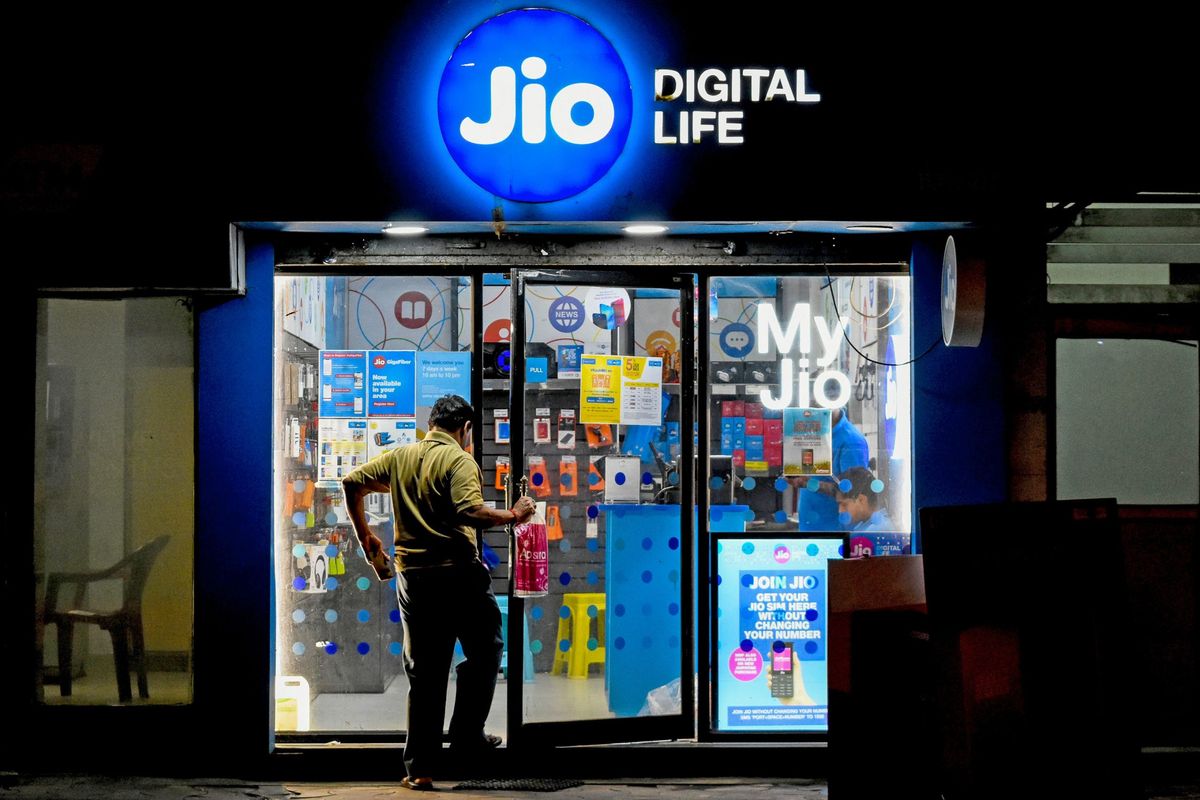Why has India’s Jio become the world’s hottest investment opportunity?

A few minutes every morning is all you need.
Stay up to date on the world's Headlines and Human Stories. It's fun, it's factual, it's fluff-free.
Indian telecom giant Jio Platforms has seen its fortunes rise exponentially recently, with tens of billions of dollars in foreign investment raised around the world since the beginning of the year.
Jio, a subsidiary of Reliance Industries, India’s largest corporation, headed by India’s wealthiest man, Mukesh Ambani, has achieved this huge round of investment from global names despite the worldwide impact of the coronavirus pandemic.
The company’s success in securing over US$20 billion in investment since April of this year has much to do with Jio’s own meteoric rise over the last several years. The changing geopolitical atmosphere of the world, which has seen the United States attempt to decouple itself economically from China, has pushed tech giants to look more closely at what is a rapidly growing Indian market.
In these changing tides, it’s Jio and its powerful head, Mukesh Ambani, who stand to benefit the most.
Investment flurry
Jio, India’s largest telecom service provider, has seen a surge in investments in the last few months.
In April of this year, it was announced that the social media giant Facebook was in talks to invest heavily in Jio. Facebook was reported to be considering a 10% stake in the company, for a total of US$5.7 billion.
Facebook had long wanted to make a formal entry into the Indian market. Facebook-owned WhatsApp and Facebook’s social media platforms had already made an impression in the country. The number of WhatsApp users in the country is around 400 million while Facebook itself reportedly has 300 million Indian users.
Facebook’s deal was approved in June by India’s antitrust watchdog, which had originally looked into the deal for signs that the American company may potentially misuse users’ data.
The head of Reliance Industries (and Jio’s overall owner), Mukesh Ambani, had previously stated at a summit in 2018 that “data is the new oil” and that “steps will have to be taken to migrate the control and ownership of Indian data back to India.”
The Indian billionaire had also declared that “data colonisation is as bad as the previous forms of colonisation.” Evidently, Ambani’s past concerns over foreign corporations having access to Indian data were dwarfed by the nearly US$6 billion deal.
Following the announcement of Facebook’s investment, a number of other entities raced to invest in the network provider and telecoms service.
The Abu Dhabi Investment Authority, alongside its sister-state owned investment fund, Mubadala, as well as the Saudi Arabian Public Investment Fund were all in talks to invest billions of dollars into Jio Platforms and acquire a stake in the company.
After this round of investment, Ambani had announced that this was the “end of Jio Platforms’ current phase of induction of financial partners.”
This was evidently not the case, as news arrived that the American chipmaker and technology giant Intel was investing US$253.5 million for a 0.4% stake in Jio. Wireless technology specialist Qualcomm invested another US$97 million for a 0.15% stake and Google topped off the latest round of investment with a massive US$4.5 billion for a 7.73% stake in Jio Platforms.
This significant investment from global firms – largely American firms – has raised Jio Platform’s equity valuation to some US$58 billion and has made good on Mukesh Ambani’s promise to clear Reliance Industries’ net debt, estimated around US$21 billion, by early 2021, well ahead of schedule.
Jio’s explosion
Founded in 2016, Jio’s entrance completely upended what is a very competitive Indian telecoms market. To challenge its rivals, the new network provider offered unlimited 4G data and calls for its customers for six months, luring in millions in the process.
After this initial strategy, Jio then managed to convert these free subscribers into paying customers. Jio is now the largest network provider in India, with its low prices having forced its rivals to try to copy it, albeit with less success.
Jio’s huge investment round comes partly as a result of the company’s proven success and meteoric growth over the last four years. Add in the crucial backing of Reliance Industries, the largest and richest company in India, and Jio appears to be a safe investment.
Jio has made no sign that it is content with simply maintaining its current level of subscribers, however. Reliance’s Mukesh Ambani has it made clear on numerous occasions that he wants to expand network coverage and smartphone use across India, a country where hundreds of millions still do not have access to smartphones or the internet on a regular basis.
This goal has been echoed by foreign investors, who clearly see opportunity in Jio’s vision of expanding its share of the huge, yet not fully exploited, Indian market.
Commenting on its US$97 million investment in Jio, Qualcomm’s chief executive, Steve Mollenkopf, highlighted the opportunity to help play “a role in Jio’s vision to further revolutionize India’s digital economy” as a significant driver of investment.
Elsewhere, some American companies have shifted production and operations to the country in order to tap into what is seen as a growing and increasingly prosperous consumer market in India.
The spate of investment in Jio Platforms also comes with broader, more international, considerations.
The recent stand-off between the US and China has seen an escalation of the trade and tech wars between these two countries, which has made investment opportunities more difficult for multinational corporations.
One source who spoke to TechCrunch stated that at least one firm’s investment in Jio Platforms came as they were trying to cut down reliance on China, given the escalating tensions and uncertainty there.
Multinational tech giants including Facebook and Google recognize in India a market that is of a similar size to China’s, but that holds significantly greater untapped potential.
Jio also stands as a potential rival to more-advanced Chinese 5G providers.
In investing in Jio Platforms, the American wireless provider Qualcomm stated that it would assist Jio in developing 5G infrastructure and services for Indian customers. Chinese provider Huawei currently dominates the Indian market in this respect.
Reliance Industries, the owner of Jio Platforms, is also uniquely placed to receive significant amounts of foreign investment.
Reliance’s Mukesh Ambani is a close ally of Indian Prime Minister Narendra Modi, who has allegedly made it easier for foreign investors to invest in Jio and avoid stringent antitrust and regulatory action.
Whether driven by geopolitical re-configuration due to the rising uncertainty and instability in US-China relations, the closeness between Jio’s owner and the ruling Indian government, or Jio’s own rapid growth and success over the last four years in upending the Indian telecoms market, the company has managed to thrive and make billions during the COVID-19 pandemic.
Have a tip or story? Get in touch with our reporters at tips@themilsource.com




Comments ()